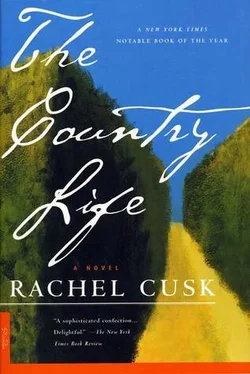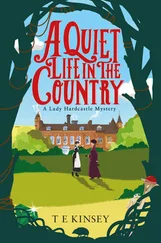To continue, I was not feeling quite myself — a dangerous condition, leading to the sort of behaviour people describe as being ‘out of character’ — as we entered the Elizabethan Rose Garden. This did not, however, blur my impression of the lovely enclave in which I now stood. The garden was quite idyllic; indeed, my amorphous mental state may well have been responsible for the force of my reaction to it. It was rectangular in shape, and consisted in several long rows and wedges of rose bushes with a maze of well-kept gravel paths between, all perfectly symmetrical; a geometrical theme which gave the garden a look of arcane symbolism, like an astrologer’s map. Here and there wrought-iron benches were placed; and at the very centre of the garden, standing on a smooth circle etched in gravel, was an old stone sundial. The roses, being in filli bloom, were a grand, faded pink and many of them were very large. I reached out to touch one beside me, whose head hung engorged from its stem. To my embarrassment, it disintegrated instantly beneath my fingers in a gentle explosion of velvet petals, falling in a sort of confetti about my feet. I could not help but think, looking at the naked stem, that I had murdered the lovely flower; and I cast about for Martin, hoping that he had not witnessed my act of vandalism.
Fortunately he was nowhere to be seen. Thinking that he must have wheeled off along one of the paths, I set off at no great pace down the nearest avenue to hand to find him. I was, in fact, happy to be alone. The garden was very quiet, its only music the faint, chirruped chords of summer, and in the scented hush I found myself transported back through time to its ‘Elizabethan’ ancestry, imagining myself there to be an altogether more favoured and elaborately costumed Stella, enjoying privileged seclusion in a world as orderly beyond these walls as within them; a respite of scale rather than substance, furnished by an authority who granted her every whim as systematically as it confounded mine. I often, incidentally, have fantasies of this type. Being essentially happy with myself, my daydreams strive instead to transform my circumstances; usually preferring a more kindly age, offering iron-cast certainties and a less vertiginous view of the future.
I had sat down on a bench beside the sundial by this time and — perhaps, again, due to the peculiar effect of the sun — all at once found that my daydream had delivered me, as if through a secret tunnel bored beneath a fortress wall, to the outermost, unpatrolled reaches of thought where lately I had forbidden myself to wander. The garden faded and then vanished before my eyes, and in the analgesic white light which followed it I was unexpectedly met by a vision. The vision was of a crowded street seen from high above; not an English street, but a narrow, Continental chasm. Everything was very brown and dusty and noisy. From my vantage point I could see the lacy balustrades of balconies depending high up from the elaborate, crumbling fronts of buildings; and then realized that I, too, was standing on a balcony with my fingers gripping the iron railing. I leaned perilously over the edge and saw far, far below trails of tiny, dusty cars beetling along the floor of the ravine. The sun was hot on the back of my head. I was leaning so far over that the rail dug into my stomach. The weight of a solid but indeterminate misery pressed at my back as I leaned, forcing me further over still. The blare of car horns filled my ears. My heart was thrashing in my chest with terror. Then, all of a sudden, I flipped over and fell; but to my surprise, I did not plummet to the pavement. Instead I floated, my weightless body describing elegant arcs like a fluttering leaf, and as I gently descended I looked about. One or two people stood on the balconies opposite and when they saw me they waved. I waved cheerfully back; and it must have been at around this point that I woke up, or came to, and found myself back in the rose garden.
Perhaps less than a minute had passed since I had exited so importunately from the present moment. When I returned the loveliness of the quaint garden, momentarily forgotten, struck me with redoubled force. In this instant of recognition — whose constituent parts, memory and perception, were in this case particularly charged — I experienced the magical, elusive flash of certain happiness: something I had not felt for some time and which, arising as it did from a rapid modulation of fear to safety, provided the substance for my first, indelible identification of Franchise Farm as home.
‘What are you doing here, Stel-la?’
Martin was sitting beside me on the gravel path in his chair, his presence so complete and unheralded that it had the flavour of an apparition. His face was screwed into a grimace in the sunlight so that it seemed frozen in an attitude of rigid surprise, as if a door had been slammed on it.
‘I’m thinking,’ I said. His question, insinuating as it was, demanded a fuller reply. ‘I was thinking,’ I improvised, ‘of how amazing it is that this garden has been here since Elizabethan times. One imagines history to be inorganic, and yet here it is, written into the landscape.’
I was rather proud of this insight, but Martin seemed to find something funny in it.
‘Ha, ha!’ he brayed, mouth agape. ‘Ha, ha!’
‘What?’
I fully expected him to repeat my comment, in a voice which would ensure that not one of its nuances was left unmocked. This feeling was not altogether new to me: I find speech a precipitous and exposing business, and often perform it with palpable ‘stage fright’; a feeling which, I don’t doubt, has resulted over the years in the formality with which now I am unable to avoid expressing myself.
Martin, meanwhile, having prolonged his hilarity beyond all reasonable limits, finally gave me his reply:
‘The garden isn’t Elizabethan , you idiot! It’s a breed of rose, the Elizabethan rose. Grumps planted them.’
‘Who,’ I enquired, ‘is Grumps?’
‘My grandfather,’ said Martin primly, as if he were offended that I hadn’t heard of him.
‘Well, I can’t say I’m not disappointed,’ I maintained, after a pause. ‘Although he did a good job of it.’
‘It’s open to the public,’ said Martin, still apparently affronted. ‘Every Saturday during the summer. It’s very well known. People pay to come and look at it.’
I found this information rather surprising, suggesting as it did that the Maddens had been driven by penury to make a going concern of their own garden.
‘I think that’s sad,’ I said.
‘Why?’
‘Because it’s a private place. I liked the thought of it being secret. Knowing that it’s an exhibit spoils it.’
‘If one is fortunate enough,’ pronounced Martin, ‘to possess something unique, of more than average worth, one has a duty to share it with one’s fellow man.’
‘I wouldn’t know about that,’ I replied. ‘But if all this were mine, I don’t think I’d want to share it with anyone.’
‘There you are.’ Martin folded his arms with satisfaction. ‘That’s why things are better off in our hands. We know how these things ought to be done.’
‘Who is “we”?’ I enquired.
‘The upper classes,’ said Martin, his face crumpled and white, like something botched and screwed into a ball. I caught a glimpse of the cavity of his mouth, dark and moist.
‘I do apologize,’ I said sarcastically. ‘I didn’t realize that was who you were.’
‘Our family,’ intoned Martin, ‘has lived in this house since the seventeenth century, and in this area since long before that.’
‘Does that make you upper class?’ I was becoming quite irritated, in a desultory fashion. ‘I’d have thought it just makes you local Anyway,’ I closed my eyes and leaned back against the elaborate grid of the bench, and as it pressed into my flesh the taste of my vision lingered briefly on my tongue, ‘aren’t you a bit old to be boasting about your family? There used to be girls who did that at school. If they weren’t comparing how much money their parents had, they were droning on about some old relative of theirs in a bearskin who’d got his name in the Domesday Book.’
Читать дальше












